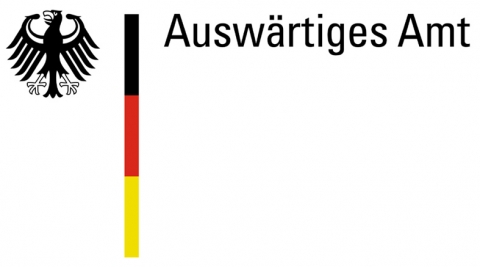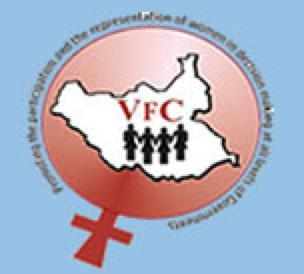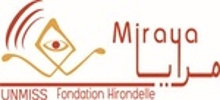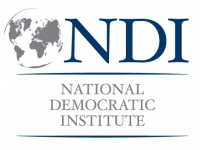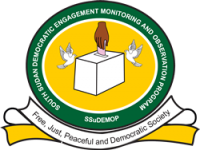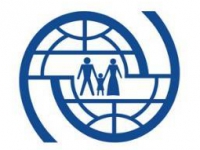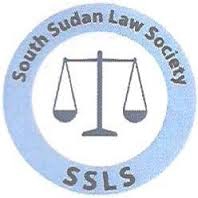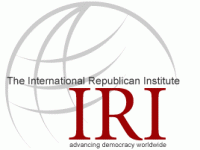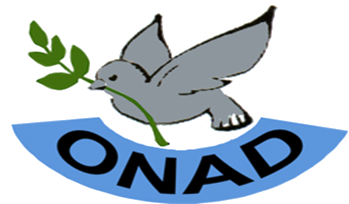Juba, November 24th 2017, Community Empowerment for Progress Organizaion conducted an oversight observation of the reports issued by Joint Monitoring and Evaluation Commission on the implementation of South Sudan Peace Agreement. The exercise aims at examinig JMEC's facts on the status of the peace agreemtn with specific focus on generating information for effective advoacy.
OVERSIGHT OBSERVATION
JOINT MONITORING AND EVALUATION COMMISSION
REPORT ON THE IMPLEMENTATION OF THE
AGREEMENT ON THE RESOLUTION OF CONFLICT IN SOUTH SUDAN
South Sudan conflicting parties in August 2015 signed peace accord mediated by the regional bloc Intergovernmental Authority on Development aimed at ending the perpetual conflict that breaks out in Mid-December 2013. The Joint Monitoring and Evaluation Commission JMEC was established to monitor the effective implementation of the peace deal. The Commission’s mandate is provide monitoring and evaluating reports on the implementation status of the various chapters of the peace agreement. Since its establishment, JMEC has issued number of reports and one of its effective mechanism among the six institutions/board namely (National Constitutional Amendment Committee (NCAC), Ceasefire and Transitional Security Arrangements Monitoring Mechanism (CTSAMM), Joint Military Ceasefire Commission (JMCC), Strategic Defense and Security Review (SDSR), Board of Special Reconstruction Fund (BSRF) and Economic and Financial Management Authority (EFMA)called Ceasefire and Transitional Security Arrangements Monitoring Mechanism (CTSAMM) also issued number reports on the violation of the permanent ceasefire by the conflicting parties in South Sudan. The given timeline for the implementation of the peace deal is approaching its deadline while the question whether the agreement was effectively implemented is on the top of the public minds.
Therefore, JMEC took time to provide answers to this question and conducted specific evaluation of the peace deal by providing evaluation reports on each chapter of the peace deal. JMEC has issued six reports which were reviewed by CEPO.
CEPO took enough time to review each report and provide oversight observation reports on the implementation of the peace agreement and performance of JMEC and its various mechanisms since August 2015. This oversight observation report provide CEPO’s take on JMEC peace agreement implementation evaluation report published on 27th October 2017 in JMEC official website. CEPO as civil society is eligible to provide oversight observation on any official report issued by JMEC or one of its six institutions.
PURPOSE/OBJECTIVES OF THE REPORT
1. Examining JMEC facts on the status of the peace agreement with specific focus on these two objectives.
2. To generated information for effective advocacy on IGAD led revitalization of the peace agreement.
3. To respond to JMEC on their facts and encourage them to do more for the sake of keeping the public informed on the status of the peace agreement implementation.
METHODOLOGY
This report was generated through desk review reports published in JMEC official website on status implementation status of each chapter of the signed August 2015 peace agreement. Each chapter’s report issued was reviewed by CEPO and the findings of this were drawn.
SUMMARY OF THE OBSERVATION
It is first time that JMEC has effectively conducted evaluation on the status of the implementation of the peace agreement. The previous reports issued by JMEC were on the status of the peace agreement. Those reports were not evaluation focused. The published reports on each chapter of the peace agreement were rich with facts on the status of its implementation. The reports confirmed what CEPO has observed on the status of the peace execution. The justifications for the ineffective implementation were mentioned by JMEC per chapter of the agreement. The observations done by JMEC were real, factual and concrete on what has happened with the implementation of the peace agreement. The recommendations given are impressive and encouraging if they will be taken by the mediators and South Sudanese parties to the peace agreement serious without reservations.
PRINCIPLE OBSERVATIONS
1. The status of the peace implementation: JMEC evaluation draws clear findings on the status of the peace agreement implementation.
2. The spirit of the parties to the peace agreement: JMEC evaluation has clearly pointed out issues associated with political will and good faith politics for speeding effective implementation of the peace agreement.
3. Chapters of the peace agreement: JMEC findings on status of each chapter implementation are true.
4. JMEC Observations and Recommendations for Way forward: JMEC observations and recommendations were genuine and concrete on issues that dragged the implementation of the peace agreement.
IGAD-LED PEACE REVITALIZATION PROCESSES
It is essential to address issues identified by JMEC evaluation to avoid other future frustrations. JMEC evaluation findings clearly demonstrated that entry point for making peace happen in South Sudan is the effective implementation of the peace agreement chapter one and two. The IGAD-led revitalization process should clearly define what is meant by revitalization. Once the revitalization is far from restructuring chapter one and two of the peace agreement for creation of political will and good faith politics, then the revitalization is nothing. For the revitalization of peace to provide functional solutions for attainment of peace and stability in South Sudan, it requires strategic restructuring of the peace agreement chapters one and two. The revitalization process should not forget strengthening mandates of the peace agreement implementation specifically National Constitutional Amendment Committee (NCAC) and Ceasefire and Transitional Security Arrangements Monitoring Mechanism (CTSAMM)
IMPROVEMENT OF PROVISIONS LANGUAGE: CEPO through the exercise of assessing the JMEC six reports on Evaluation of each chapter of the peace agreement, CEPO realized that there is absence of clear language on Protection of civilians and Security Sector Reform. Therefore CEPO is recommending that these phrases should be included in chapter two
CONCLUSIONS
CEPO was impressed by JMEC’s evaluation of the peace agreement implementation status per each chapter. The past reports of JMEC were not solid on situation facing the implementation of the peace agreement. This has contributed in making the parties to the peace agreement relax in availing political will for timely implementation of the peace agreement. These six reports issued by JMEC have contributed effectively in informing the citizens on what is wrong with the implementation of the peace agreement. This has made the citizens aware of who failed to delivery for the effective implementation of the peace agreement. Further, JMEC has demonstrated through the evaluation reports that are only tasked with the responsibility of monitoring and evaluating the implementation of the peace agreement. The issues of misconception among the public that JMEC is tasked with responsibility of implementing the peace agreement is clearly sorted by these six reports on evaluation of the peace agreement by JMEC. For IGAD-led revitalization of the peace process, it is essential to start by addressing the observations and recommendations raised by JMEC evaluation on the status of the peace implementation per chapter. CEPO was expecting that JMEC should mention something about lack of respect and honor of some of the implementation mechanism mandate by the peace agreement parties. We have observed serious lack of respect from the armed parties to the peace agreement on mandate of Ceasefire and Transitional Security Arrangements Monitoring Mechanism (CTSAMM). Denying CTSAMM the access to accomplish its mandate of monitoring and verifying incidences of violation of the permanent ceasefire is serious and should be addressed by the IGAD-led revitalization effectively. Further, purposely the parties to the peace agreement turned back for National Constitutional Amendment Committee (NCAC) in executing their mandate as a key institution for opening up windows for effective implementation of the rest of the provisions of peace agreement. NCAC is a principle institution that is tasked to incorporate the peace agreement into the transitional constitutional as a method of institutionalizing the peace agreement. But the parties to the peace agreement intentional obstructed NCAC in accomplishing its mandate. NCAC is the critical institution that should be empowered and allow to deliver their task urgently without any political obstruction or manipulation. IGAD-led revitalization process should also include strengthening the mandates of the peace agreement implementation institutions.



